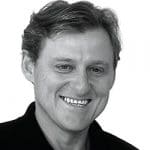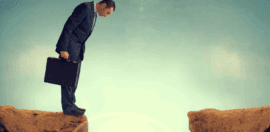On Earth as It Is in Heaven

17 December 2018 at 7:30 am
In his final column, psychologist Adam Blanch considers the connection between human suffering and happiness, and what it takes to really be yourself.
As Christmas draws near I find my thoughts turning towards the plight of mankind once again.
Human suffering is an issue that has troubled and fascinated me since my earliest memories. Probably no mystery then that I became a psychologist, but that wasn’t always the goal.
At one time I thought that politics was the answer, that the application of just laws and social equity could bring about the golden age. But then I encountered the reality of politics with its conundrums and corruptions.
I also, albeit briefly, thought that religion might offer a path forward, the judicious application of moral law, but that hope too collapsed under the weight of beatific stone edifices sustained by ugly secrets and vile crimes. It’s not that I have anything against religion. They seem to start with good ideas and I like the idea of people coming together in spiritual communion, especially all the singing. It’s just that, in the worlds of the philosopher Voltaire: “In the beginning God created man in His own image, and man has been trying to repay the favour ever since.”
Similarly, I placed my faith in education for a while, but there were some terrifically well-educated villains wandering around. The more educated people become the more some of them see to become lost in impractical ideologies and narcissistic notions.
Whenever people seem to achieve the throne of power, any type of power, they almost always use it pretty much the same way that the last occupant did. I don’t think they mean to. I think they are quite sincere when they set out to remove the current tyrannical ruler that they will use the power they take for good and reshape the world in loving ways. However, it seems to me now that it is the throne that shapes the bottom sitting on it, rarely the bottom that shapes the throne.
Indeed, of the many great human advancements the only one that seems to remain blameless is sanitation. Good sewerage never seems to have done anyone any harm.
So, after a great many disillusionments, I eventually turned to a more philosophical approach and invested my remaining faith in the idea of the golden rule – the concept of treating others as you would like to be treated, love thy neighbour as thyself. But that too failed me.
If the practice of psychology has taught me one thing, it’s that people treat themselves abominably, and then treat others just the same.
Now, as I crawl reluctantly over the crest of a half century on planet earth I have come to a much simpler conclusion – human suffering will end when people learn to love themselves, period.
You see, happy people don’t hurt people. It is generally only hurt people that hurt people.
Happy people have no need of dominance, aggression, exploitation and unwarranted violence. Happy people don’t even need to try to love others, it just comes naturally, an unavoidable outpouring of their own state of being. Happy people are naturally responsible, naturally kind and naturally generous.
Which begs the question, and I’m not the first to ask it, how do we become happy?
After 35 years of intensive study, I’ve arrived at a few conclusions.
- Radical responsibility
There is nothing that will destroy happiness quite the way blame (of self or others) and self-pity do. It doesn’t really matter what happened to us, who hurt us or what advantages we lacked. No matter how hard our start to life may have been, or how hard it still is, it can always be resolved and improved. While there is life, there is the potential for change.
It may not be easy, or pleasant, but it is possible, and the alternative is to sit around complaining, which almost always makes things worse.
Any able human being over the age of 18 has the power and the responsibility to meet their own needs in life. Almost everyone can change their stars, if they are willing to learn, work and grow. The good thing is that just the act of self-responsibility brings a kind of happiness called pride, long before it produces any real-world outcomes. Self-pity and blame only bring shame.
- Self-respect
The other great barrier to happiness that presents itself to my consultation rooms daily is self-negation. I literally spend half my working day showing people that it is okay to value and assert their own needs, and teaching them to make themselves important. It is amazing to me how many people love their neighbour but hate themselves, or who fear valuing themselves because they think this is selfishness. This is the opposite of happy.
Until a person is willing to give themselves what they need they are mostly useless to others. At best, they engage in a codependent and sometimes passive aggressive unconscious “deal” whereby they give others what they want in the hope that it will be reciprocated, which it often isn’t.
A person who meets their needs first becomes a fountain that overflows love into the lives of others. A person with an empty cup does little good in the world and may do great harm. In short, we can only truly love others as we love ourselves. It is not selfish to be selfish, because the “self” is not naturally selfish. The neglected self can get a bit cranky though.
- Know thyself – be thyself
Back when I was an insecure traumatised young person people would say this to me a lot. It drove me nuts.
I knew they meant well, but what they didn’t understand is I didn’t know what they were talking about. “What is this ‘self’ that I’m supposed to be?”, I would cry silently inside my head, while desperately trying to figure out how to get their acceptance.
They couldn’t tell me either, because they had always had a “self”, but they didn’t really know what it was. It’s a bit like taking beginner dancing lessons with a teacher who has been learning to dance since they were three – they just don’t understand that the physical vocabulary they have is not there in their students.
Finding the answer to this question dramatically changed my life. Want to know what it is? It’s the right hemisphere of your brain.
Freud called it the Id (which is German for “It”). He called the left hemisphere the Ego, and they are very different. The left hemisphere of your brain is there to adapt to the world you find yourself in. it constructs an identity, a series of beliefs, ideas and behaviours that are designed to get you accepted and loved by your parents and the world at large. It’s a bit of an actor really, pretending and roleplaying to survive.
The right hemisphere is there to adapt the world to you. It is the seat of our desires, our values, our talents and our aspirations. It is who we “feel” our self to be, our unique biopsychological being. The Id wants to express itself, to make its unique contribution, to follow its impulses and to make its world to suit what feels good to it. It’s like a happiness compass.
It is nature’s way of specialising human beings to play the many roles that need to be filled in life. Some of us are warriors, some are healers, some farmers and some physicists. Butcher, baker or candlestick maker, it’s pre-programmed into your genes, and it feels good to do it. That is how nature rewards us for playing our part. It’s also why it is so damaging when parents force their children into pursuing careers that the parents think are the right ones. If they get it wrong (and they usually do), they have set their children up for misery.
The right brain communicates through emotions. If we are aligned with our natural values and desires we experience positive emotions like passion, excitement, pride and hope. If we aren’t, we get painful emotions like sadness, shame, anger and despair. Being you is the best thing you can do for the world, and the bonus it that it makes you happy too. Win-win.
If everyone would do this, we would find that life worked out pretty well and that the world was mostly a place full of happy, contented people who had no need or interest in hurting others. Of course, that’s not entirely true. There are people out there who are naturally too selfish, careless and domineering, regardless of their upbringing. But nature always seems to provide the remedy, in the form of those who are naturally driven to be protectors and warriors.
So as the year draws to a close and thoughts turn towards new year’s resolutions, please allow me to suggest one – “I’m going to be me this year”.
Instead of the usual commitments to weight loss and fitness (which are usually ego driven attempts to get love) why not make a commitment to really become the you that is on the inside and let the rest work itself out.
To put that in the language of a children’s book that I’ve written (yet to be published, open to offers):
But hope there is, if hope you need
To set against the despair and greed
Allow me just this once, or twice
To offer you some good advice
Find the thing that suits you best
And leave the rest up to the rest
Give the world all that you can
And worry not about the plan
Measure days in smiles and song
And pardon those who do you wrong
And when each day comes to its close
Be happy to be one of those
Who gives and takes in equal measure
(Excerpt from Clever Monkey – A Children’s Fable)
I hope that helps.
I wish you a Merry Christmas and Happy New Year.
About the author: Adam Blanch is a Melbourne-based psychologist, who supports clients around Australia. He provides support for individuals and group trainings for organisations through Good-Psychology, and a specific service for men’s health and wellbeing through Mentor Psychology. He is also a member of The Xfactor Collective community.
Please note the views expressed are the opinion of Adam Blanch and do not necessarily reflect the views of Pro Bono Australia, its staff or contributors.







